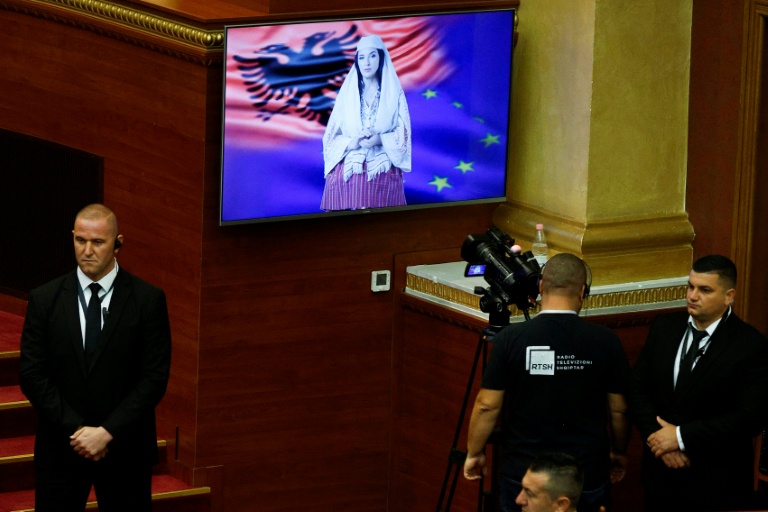Science
Albania Appoints World’s First AI Minister Amid Controversy

Albania has recently appointed an AI-generated minister, named Diella, to oversee a new public tenders portfolio. This unprecedented move, announced by Prime Minister Edi Rama, aims to combat corruption in government contracts, a significant barrier to the country’s aspirations for European Union membership. The appointment has raised a host of technical, political, and ethical questions about the implications of entrusting public governance to a virtual figure.
Diella’s Ambitious Mandate
In his announcement, Rama asserted that Diella would ensure public tenders are “100 percent free of corruption.” He highlighted the advantages of an AI minister, stating that “Diella never sleeps, she doesn’t need to be paid, she has no personal interests, she has no cousins.” This statement reflects a deep-seated concern in Albania, which ranks 80th out of 180 in the Transparency International corruption index. Numerous politicians in the country have faced corruption allegations, including the former mayor of Tirana, who remains in custody for suspected wrongdoing related to government contracts.
The notion of a virtual minister untainted by human flaws raises hopes for reform. Yet, many experts remain skeptical about the effectiveness of such an initiative.
Expert Opinions on AI Governance
Critics argue that the success of an AI system like Diella hinges on the quality of the data it processes. Erjon Curraj, a digital transformation and cybersecurity expert, emphasized that AI’s performance is directly linked to the integrity of the data and models utilized. “If input data is incomplete, biased, or outdated, the AI’s decisions will reflect those flaws,” Curraj explained. He warned that Diella could misinterpret documents or overlook signs of collusion if the underlying data is flawed.
Similarly, Jean-Gabriel Ganascia, a computer scientist specializing in artificial intelligence, pointed out that AI systems can inherit societal biases. He noted, “There’s no reason to believe it solves the problem of corruption.” Ganascia also raised concerns about the implications of relinquishing decision-making power to a machine, asserting that it could lead to a lack of accountability.
The Albanian opposition, led by former Prime Minister Sali Berisha, has expressed apprehension regarding the control of Diella. Berisha posed a critical question in parliament: “Who will control Diella?” This inquiry underscores the fundamental issue of accountability in AI governance, which Ganascia described as essential. He argued that entrusting public decision-making to a machine could result in a loss of responsibility and deliberation among human officials.
In response to these concerns, a recent decree clarified that Prime Minister Rama would retain responsibility for the creation and operation of the virtual ministry.
Impacts and Future Prospects
The announcement of Diella has garnered international attention, a hallmark of Rama’s leadership style. His previous initiatives, such as attending international events in sneakers and proposing a TikTok ban, have similarly made headlines. However, the actual implementation of these policies often faces significant challenges. For instance, TikTok remains accessible in Albania, and the legality of the migrant camps established for individuals intercepted at sea is still under judicial review in Italy.
With regard to Diella, it remains uncertain whether the virtual minister’s appointment will withstand scrutiny from the Constitutional Court. The AI’s likeness is based on that of Anila Bisha, a well-known Albanian actress, who has a contract for the use of her image expiring in December 2024. Political scientist Lutfi Dervishi expressed skepticism about the initiative’s potential, stating, “If a corrupt system provides manipulated data, or filters are set up on what it must not see, Diella will merely legitimise old corruption with new software.”
As Albania seeks to align with EU standards within the next five years, the effectiveness and transparency of Diella’s governance will be put to the test. The coming months will reveal whether this innovative approach to public administration will lead to meaningful reforms or merely perpetuate existing issues under a digital façade.
-

 Science2 months ago
Science2 months agoToyoake City Proposes Daily Two-Hour Smartphone Use Limit
-

 Health2 months ago
Health2 months agoB.C. Review Reveals Urgent Need for Rare-Disease Drug Reforms
-

 Top Stories2 months ago
Top Stories2 months agoPedestrian Fatally Injured in Esquimalt Collision on August 14
-

 Technology2 months ago
Technology2 months agoDark Adventure Game “Bye Sweet Carole” Set for October Release
-

 World2 months ago
World2 months agoJimmy Lai’s Defense Challenges Charges Under National Security Law
-

 Technology2 months ago
Technology2 months agoKonami Revives Iconic Metal Gear Solid Delta Ahead of Release
-

 Technology2 months ago
Technology2 months agoSnapmaker U1 Color 3D Printer Redefines Speed and Sustainability
-

 Technology2 months ago
Technology2 months agoAION Folding Knife: Redefining EDC Design with Premium Materials
-

 Technology2 months ago
Technology2 months agoSolve Today’s Wordle Challenge: Hints and Answer for August 19
-

 Business2 months ago
Business2 months agoGordon Murray Automotive Unveils S1 LM and Le Mans GTR at Monterey
-

 Lifestyle2 months ago
Lifestyle2 months agoVictoria’s Pop-Up Shop Shines Light on B.C.’s Wolf Cull
-

 Technology2 months ago
Technology2 months agoApple Expands Self-Service Repair Program to Canada









